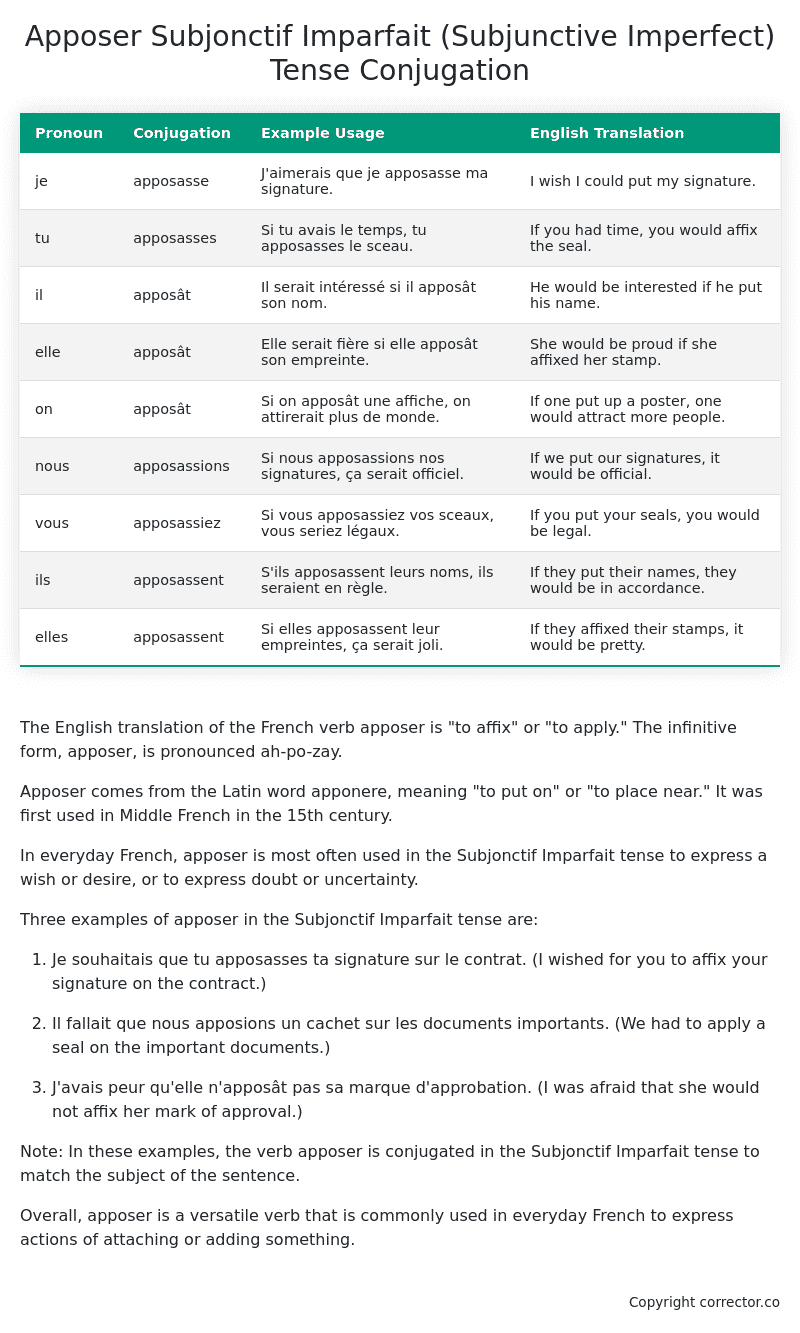Subjonctif Imparfait (Subjunctive Imperfect) Tense Conjugation of the French Verb apposer
Introduction to the verb apposer
The English translation of the French verb apposer is “to affix” or “to apply.” The infinitive form, apposer, is pronounced ah-po-zay.
Apposer comes from the Latin word apponere, meaning “to put on” or “to place near.” It was first used in Middle French in the 15th century.
In everyday French, apposer is most often used in the Subjonctif Imparfait tense to express a wish or desire, or to express doubt or uncertainty.
Three examples of apposer in the Subjonctif Imparfait tense are:
-
Je souhaitais que tu apposasses ta signature sur le contrat. (I wished for you to affix your signature on the contract.)
-
Il fallait que nous apposions un cachet sur les documents importants. (We had to apply a seal on the important documents.)
-
J’avais peur qu’elle n’apposât pas sa marque d’approbation. (I was afraid that she would not affix her mark of approval.)
Note: In these examples, the verb apposer is conjugated in the Subjonctif Imparfait tense to match the subject of the sentence.
Overall, apposer is a versatile verb that is commonly used in everyday French to express actions of attaching or adding something.
Table of the Subjonctif Imparfait (Subjunctive Imperfect) Tense Conjugation of apposer
| Pronoun | Conjugation | Example Usage | English Translation |
|---|---|---|---|
| je | apposasse | J’aimerais que je apposasse ma signature. | I wish I could put my signature. |
| tu | apposasses | Si tu avais le temps, tu apposasses le sceau. | If you had time, you would affix the seal. |
| il | apposât | Il serait intéressé si il apposât son nom. | He would be interested if he put his name. |
| elle | apposât | Elle serait fière si elle apposât son empreinte. | She would be proud if she affixed her stamp. |
| on | apposât | Si on apposât une affiche, on attirerait plus de monde. | If one put up a poster, one would attract more people. |
| nous | apposassions | Si nous apposassions nos signatures, ça serait officiel. | If we put our signatures, it would be official. |
| vous | apposassiez | Si vous apposassiez vos sceaux, vous seriez légaux. | If you put your seals, you would be legal. |
| ils | apposassent | S’ils apposassent leurs noms, ils seraient en règle. | If they put their names, they would be in accordance. |
| elles | apposassent | Si elles apposassent leur empreintes, ça serait joli. | If they affixed their stamps, it would be pretty. |
Other Conjugations for Apposer.
Le Present (Present Tense) Conjugation of the French Verb apposer
Imparfait (Imperfect) Tense Conjugation of the French Verb apposer
Passé Simple (Simple Past) Tense Conjugation of the French Verb apposer
Passé Composé (Present Perfect) Tense Conjugation of the French Verb apposer
Futur Simple (Simple Future) Tense Conjugation of the French Verb apposer
Futur Proche (Near Future) Tense Conjugation of the French Verb apposer
Plus-que-parfait (Pluperfect) Tense Conjugation of the French Verb apposer
Passé Antérieur (Past Anterior) Tense Conjugation of the French Verb apposer
Futur Antérieur (Future Anterior) Tense Conjugation of the French Verb apposer
Subjonctif Présent (Subjunctive Present) Tense Conjugation of the French Verb apposer
Subjonctif Passé (Subjunctive Past) Tense Conjugation of the French Verb apposer
Subjonctif Imparfait (Subjunctive Imperfect) Tense Conjugation of the French Verb apposer (this article)
Subjonctif Plus-que-parfait (Subjunctive Pluperfect) Tense Conjugation of the French Verb apposer
Conditionnel Présent (Conditional Present) Tense Conjugation of the French Verb apposer
Conditionnel Passé (Conditional Past) Tense Conjugation of the French Verb apposer
L’impératif Présent (Imperative Present) Tense Conjugation of the French Verb apposer
L’infinitif Présent (Infinitive Present) Tense Conjugation of the French Verb apposer
Struggling with French verbs or the language in general? Why not use our free French Grammar Checker – no registration required!
Get a FREE Download Study Sheet of this Conjugation 🔥
Simply right click the image below, click “save image” and get your free reference for the apposer Subjonctif Imparfait tense conjugation!

Apposer – About the French Subjonctif Imparfait (Subjunctive Imperfect) Tense
Formation
Common Everyday Usage Patterns
Interactions with Other Tenses
Subjonctif Présent
Indicatif Passé Composé
Conditional
Conditional Perfect
Summary
I hope you enjoyed this article on the verb apposer. Still in a learning mood? Check out another TOTALLY random French verb conjugation!


